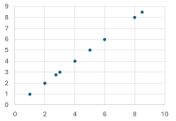ATD Blog
Why Data Literacy Matters . . . Or Why McDonald’s Arch Deluxe Disappeared
Mon Feb 05 2024

In 1996, McDonald’s unveiled a new burger called the Arch Deluxe. This was “the burger for grownups.” In an effort to gain back market share they had lost, McDonald’s did some market research and found that many people wanted a burger “catered to them.” So they released the Arch Deluxe and spent millions of dollars on advertising for it. You can still find the commercials on YouTube with Ronald McDonald dancing at nightclubs or playing a round of golf.
The launch was met more with raised eyebrows than enthusiasm or open wallets. The Arch Deluxe was ultimately pulled from the menu, and McDonald’s spent millions more on backing out of the advertising.
What happened here? The company’s market research said that people wanted this. So why did it fail? Data literacy—or knowledge about how data is gathered, reviewed, and analyzed—would have saved McDonald’s a ton of money.
What Is Data Literacy?
Data literacy is a working knowledge about how data is gathered, how it’s examined and visualized, and how its significance is measured. You can’t visit a webpage anymore without seeing that popup about how the website is gathering data on you with every click. Our world is filled with data—some of it useful, some of it . . . less so.
So when we learn about data and its significance, we’re learning how to find the relationships between the types of data we’re gathering and whether there’s a useful story there. If I plotted my number of trips to a bookstore along with my credit card balance, I’d find a definite trend, as the following image shows:

How Data Literacy Could Have Influenced the Arch Deluxe
When McDonald’s conducted market research in the mid-90s, they wanted to know what people wanted from McDonald’s. What is it people wished they offered that they currently didn’t? They recruited volunteers for market research and conducted focus groups to ask these questions, and then looked at the results.
The problem here can be hard to spot, but data literacy can shine some light. Think about it—who is most likely to participate in a focus group? Someone who has free time, likes discussing menus and how things taste, and is open to trying new things. Busy parents without the time to join a focus group likely didn’t participate in this research. People who go to McDonald’s for the price point rather than the flavor were also likely uninterested in volunteering for such a focus group.
This is what’s called sample bias or selection bias. It wasn’t intentional, but the sample of research participants didn’t represent the group McDonald’s was trying to research. Most customers don’t go to McDonald’s to sample new flavor combinations—they go because it’s cost-effective, fast, and usually a hit with children who are picky eaters. So when the research said “people want a burger catered to grownups,” it really said, “a small subset of people want a burger catered to grownups.”
This is just one trap researchers can fall into, especially if they’re unaware of it. The sample size could be too small, we can commit a correlation-causation error, or we can use poor testing procedures, where our data looks great but it’s testing for the wrong thing (looking at you, New Coke!).
The Importance of Data Literacy
Data literacy improves critical thinking. And since critical thinking is one of the most in-demand skills in the workforce today, data literacy is also an in-demand skill. According to a 2022 survey from Qlik, as much as 85 percent of business executives believe that data literacy is an important skill for success in their business. And if you want to engender strong critical thinking in employees, data literacy is a fantastic place to start.
Additionally, data literacy helps us make better decisions. When we want to buy a new car, what do we do? We look up cars and find out information about those cars. When we want to find a new restaurant to try, we go online and look at reviews of restaurants near us. This is research, and we do it all the time! So if we know a little about what the data in front of us means—and how we might be misinterpreting that data— we can make better decisions in almost every aspect of our lives.
If you’d like a bigger bite of data literacy and you’ll be at ATD TechKnowledge February 7–9, join my session! I’ll be speaking on data literacy, and we’ll do some research on ourselves and analyze the results.
More from ATD
